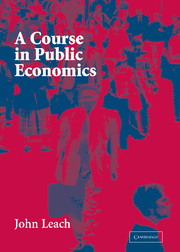Asymmetric Information and Income Redistribution
Published online by Cambridge University Press: 06 July 2010
Summary
We have, to this point, concerned ourselves with the circumstances under which a system of free markets does not give rise to a Pareto optimal allocation – that is, with failures of the first fundamental theorem of welfare economics. We now turn to the second theorem, which argues that an appropriate redistribution of endowments will allow the economy to reach any desired Pareto optimal allocation. The implication of this theorem is that we need not passively accept whatever income distribution is ground out by a system of free markets. The income distribution can be altered through simple policies that guide the economy from one Pareto optimal allocation to another. There is no conflict, this theorem suggests, between economic efficiency and the attainment of an equitable distribution of income.
Our experience with redistribution programs suggests otherwise. A tax imposed to finance transfers to the poor is like every other tax: people alter their behaviour to avoid paying it, and their collective attempts to avoid the tax generate a deadweight loss. People also alter their behaviour to increase the transfers that they receive from the government, and these adjustments also generate a deadweight loss.
The claims of the second theorem diverge from our experience because some very strong assumptions underlie the second theorem. One of these assumptions is that the government has full information about the innate characteristics of the people living in the economy.
- Type
- Chapter
- Information
- A Course in Public Economics , pp. 347 - 348Publisher: Cambridge University PressPrint publication year: 2003



